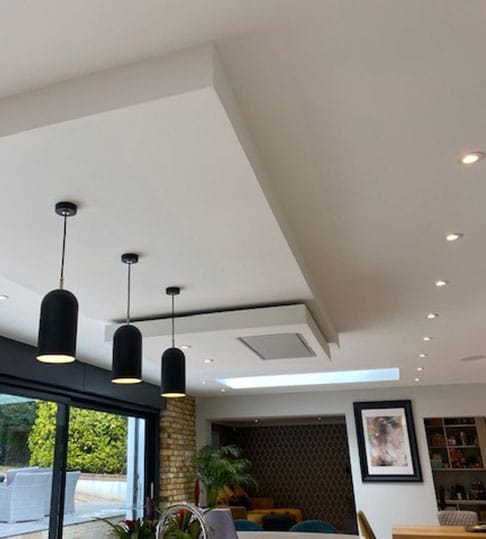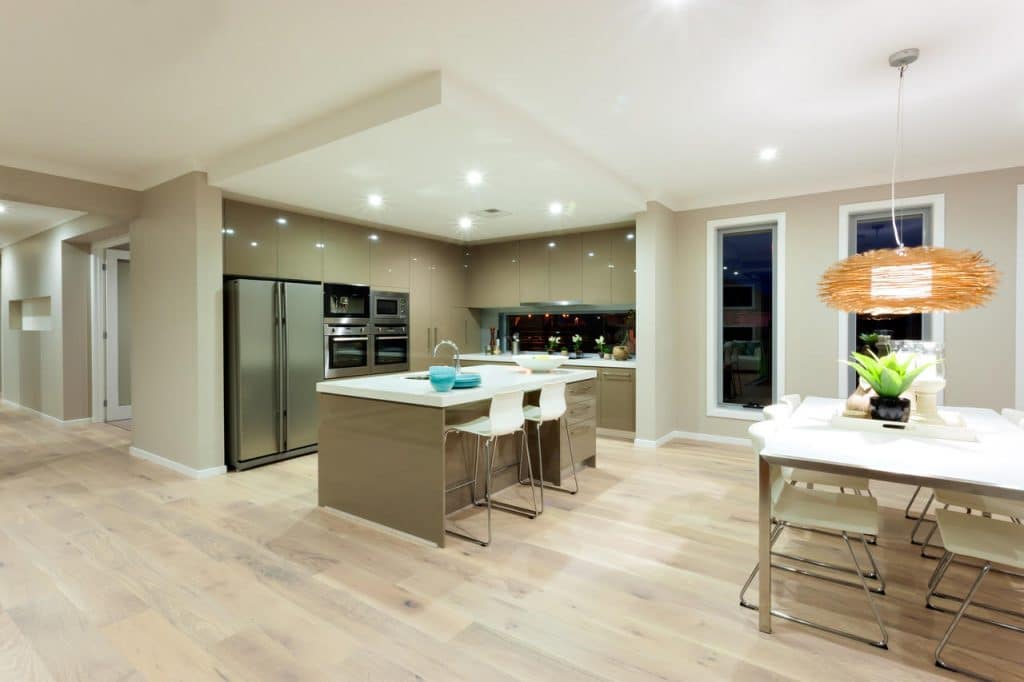Ceilings 101: Your Complete Guide to Ceilings
When it comes to redecorating our homes, we all think long and hard about our floors and walls, but many of us overlook our ceilings. However, this does not need to be the case – as the reason many neglect their ceiling is simply because they are unaware of the different types of ceiling available.
At AB Ceilings, we are experts in bespoke ceiling installations, providing clients across the UK with the ceiling of their dreams.

Types of Ceiling
The world of ceilings is varied, and there is plenty of choice available for all manner of properties. In our guide, we cover a number of ceiling installation options to help you decide on the one that is right for you.
Suspended Ceilings
Otherwise known as false, hanging or drop ceilings, suspended ceilings work well with all property types. Available in a variety of styles, including grid and tile systems and metal frame systems, suspended ceilings are installed by being suspended from the structural ceiling. This new suspended ceiling offers up an array of benefits, including being able to hide plumbing and wiring from view.
Vaulted Ceilings
Ideal for making a room brighter and helping create the illusion of space, vaulted ceilings come in several styles, including pitched brick, rib and barrel-vaulted. However, to have a vaulted ceiling installed, the property must already have a relatively high ceiling to start.
Shed Ceilings
While not as steep as a vaulted ceiling, shed ceilings are a popular option for smaller rooms due to having a slanted roof going up one side to create extra space. Shed roofs do not have such a steep incline as a vaulted ceiling, and as such, are typically found in smaller rooms like lofts or attic spaces.

Beamed Ceilings
One of the more popular types of ceiling for adding character to a room, beamed ceilings typically involve exposing the joints used for the original property structure. As such, beamed ceilings are more common in older buildings, where the beams often still stand as part of the original structure. Though for modern property owners looking to create the same impression, faux beams are available. However, for anyone considering a beamed ceiling, it is crucial to ensure there is plenty of headspace available, as adding beams can leave the room feeling smaller than it is.
Tray Ceilings
Another ceiling type ideal for creating a focal point within a property, tray ceilings get their name due to the central area of the ceiling being raised, leaving a border around the outside of the room. While tray ceilings do not possess any practical benefits, their design makes them a fashionable option for those looking to give their room a unique touch.
Stretch Ceilings
Resistant to moisture and providing good sound insulation, stretch ceilings are typically made from PVC-based material and are very versatile. The ceiling's anti-static properties also ensure it does not collect dust, making it a popular choice for buildings where hygiene is of the highest importance, such as in hospitals, restaurants and leisure centres.
Exposed Ceilings
Once more commonly associated with tired warehouses, exposed ceilings have become a trend in their own right, becoming a popular choice for those after a contemporary look. So-called due to the 'exposed' nature of the ceiling that leaves pipes and wires on display, exposed ceilings are a great contemporary option for those looking to add character and create space. However, exposed ceilings do come with some downsides, such as making it much harder to heat a room.
Tongue & Groove Ceilings
Those looking for a straightforward ceiling installation will find that tongue and groove ceilings make a great choice. Consisting of a system of boards, tongue and groove ceilings are so-called as each board has a 'tongue' shape along one side and a 'groove' on the other. These indentations allow for the boards to easily connect, which makes them relatively straightforward to install. The boards themselves are also generally inexpensive and available in various woods, making them ideal for all interior styles.
Types of Ceiling Material
Once the type of ceiling to suit your style has been decided, the next step is to choose the best material for the project. There are many types of ceiling material available, with all offering up their own benefits and disadvantages.
- Plaster – Incredibly versatile, plaster can be used on all manner of ceiling surfaces and can also be sculptured into decorative shapes.
- Drywall – Commonly used for flat ceilings, drywall’s ability to be textured gives it several benefits, including covering imperfections and acting as noise insulation.
- Wood – Available in several types, including planks or beams, wood is a common choice due to its functionality. It is also popular with those looking to add character to a ceiling, while its ability to be painted ensures it can be easily updated to fit a room's changing style and design.
- Metal – Typically used in commercial settings, metal is lightweight and resilient to the weather. Metal is also relatively easy to install on a ceiling and can provide a unique option for those after an eye-catching contemporary look for their home.
- Aluminium – Associated more with the office than the family home, aluminium is an incredibly durable option, being lightweight, water-resistant and fireproof. However, the costs involved and the difficulty in installing aluminium prevent it from being one of the more popular types of ceiling material.
- Fibreglass – An environmentally friendly option and a cheaper alternative to wood, fibreglass is a popular choice in many family homes.
Get in touch
At AB Ceilings, we have been providing commercial and domestic customers with bespoke suspended and false ceiling services for over 25 years.
To speak with one of our experts about arranging a consultation, give us a call on 01737 333 337 or 07774 162 012.

